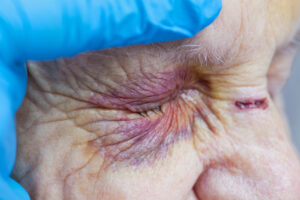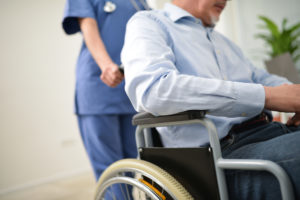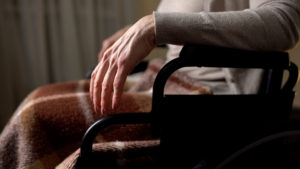
U.S. nursing homes that have been misusing dangerous antipsychotic drugs to sedate patients with dementia are currently under investigation by the federal government.
In response to years of increasing evidence that certain long-term facilities purposely misdiagnose patients with schizophrenia to get away with sedating dementia patients, the Centers for Medicare and Medicaid Services (CMS) has begun targeted audits for documentation of those diagnoses.
Antipsychotic medications such as Seroquel, Zyprexa, and Abilify have heavy sedation effects and are referred to as “chemical straitjackets.” They include a black box warning from the U.S. Food and Drug Administration (FDA) that using them on older dementia patients increases the risk of death.
Because these drugs are so dangerous, their use in nursing homes can hurt that facility’s “quality of resident care” rating in Medicare’s public nursing home comparison tool, which consists of five possible stars.
Following a previous CMS investigation into this issue, nursing homes decreased their reported use of antipsychotics to under 20 percent in recent years.
But a November 2022 report from the U.S. Department of Health and Human Services (HHS) revealed that the number of residents reported as having an unsupported schizophrenia diagnosis has nearly tripled, with 99 nursing homes reporting the disorder in at least 20 percent of patients.
That’s quite a disproportionately large number, considering that less than one percent of the American population is estimated to have schizophrenia.
Nursing Homes Gave Antipsychotics Under the Radar
A 2021 New York Times investigation discovered a loophole in the Medicare reporting regulations that allows facilities to administer antipsychotic medications to dementia patients without reporting it.
Medicare has required nursing homes to report their use of antipsychotics since 2012, but only for residents who have not been diagnosed with schizophrenia, Tourette’s syndrome, or Huntington’s disease. These conditions are routinely treated with antipsychotics.
Some nursing homes may get around the reporting rule by falsely diagnosing dementia patients with schizophrenia.
CMS’ investigation will dock any nursing homes found to be dispensing these fake diagnoses with one quality rating star; unfortunately, they currently do not plan to intervene in patient care or even inform family members of the deception.
However, Medicare will post inspection citations to its nursing home database, even if the facility’s dispute of those citations is ongoing.
The CMS initiative is part of the Biden administration’s efforts to improve patient safety and understaffing problems at nursing homes, issues that both worsened significantly during the height of the pandemic.
The lack of staff trained to properly care for dementia patients, some say, has led to the overuse of chemical restraint drugs.
Using Chemical Restraints in Nursing Homes Is Abuse
Psychopharmacological drugs or chemical restraints work as a sedative to calm down an upset nursing home resident. But they also contain harmful side effects, including increased agitation, diminished functioning and coordination, extreme sedation, memory loss, and fall risk.
Because chemical restraints take away the person’s freedom of movement, nursing homes are federally prohibited from using them on residents as a form of punishment or to make them easier for staff to handle. They may only be used when specifically ordered by a doctor or to keep the resident from harming themself or others. Purposeful misuse of antipsychotics can qualify as medical malpractice.
Contact the facility’s director if you or a loved one is experiencing suspected nursing home abuse. If you notify the facility of your concerns and continue to see symptoms of abuse, an experienced nursing home abuse attorney can help you file a lawsuit.
The nursing home abuse lawyers at Paulson & Nace have spent years helping victims of nursing home abuse in the Washington, D.C., Maryland, and West Virginia areas. Please call us today at 202-463-1999 or contact us online for more information and a free case consultation.

Samantha L. Peters focuses her practice in the areas of medical malpractice, personal injury, wrongful death, and other negligence claims.














Comments for this article are closed.